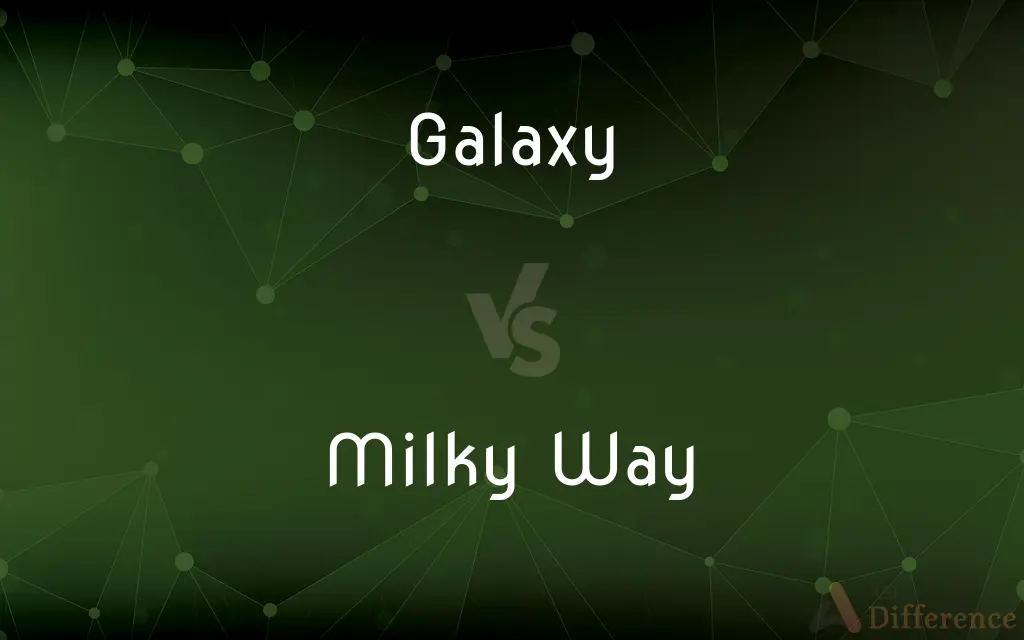Galaxy vs. Milky Way — What's the Difference?
By Tayyaba Rehman — Published on December 6, 2023
A galaxy is a vast system of stars, gas, and dust bound by gravity, while the Milky Way is our specific galaxy in which Earth resides.

Difference Between Galaxy and Milky Way
Table of Contents
ADVERTISEMENT
Key Differences
A galaxy, in the vastness of the universe, represents a system containing billions of stars, gas, dust, and dark matter, all held together by gravitational forces. On the other hand, the Milky Way is the name given to the particular galaxy that is home to our solar system. Within the context of countless galaxies spread across the cosmos, the Milky Way is just one among them.
The concept of a galaxy can be seen as a general term describing these starry systems, irrespective of their size, shape, or location. However, when we speak of the Milky Way, we refer to a distinct spiral galaxy, characterized by its unique structure and components, including the observable band of stars visible from Earth on clear nights.
While every galaxy, including the Milky Way, has its own history, formation process, and evolutionary journey, the Milky Way holds special significance for humans. It's within this galaxy that our Sun, Earth, and the entire solar system exist. Galaxies, in their varied forms and sizes, dot the universe, but the Milky Way is our cosmic address.
Considering the size and scale, most galaxies span thousands to hundreds of thousands of light-years across. The Milky Way, in comparison to some, is of average size, stretching about 100,000 light-years in diameter. Every galaxy has its own set of mysteries and wonders, but the Milky Way, being our home, is the one we've studied most intensely.
Comparison Chart
Definition
A system of stars, gas, and dust bound by gravity.
Our specific galaxy containing the Earth and solar system.
ADVERTISEMENT
Generality
A generic term for such star systems.
A specific galaxy among billions.
Significance
Represents any star system in the universe.
Holds Earth and is of particular importance to humans.
Observable Features
Varies based on the type and location of the galaxy.
Has a distinct band of stars visible from Earth, known as the Milky Way band.
Size and Scale
Can vary greatly, from dwarf galaxies to giants.
Approximately 100,000 light-years in diameter.
Compare with Definitions
Galaxy
A galaxy's size can range from a few thousand to hundreds of thousands of light-years across.
The vastness of a galaxy is hard to fathom.
Milky Way
The Milky Way's band is a dense path of stars visible from Earth.
On a clear night, the band of the Milky Way stretches beautifully across the sky.
Galaxy
A galaxy is a massive system bound by gravity, containing stars, planets, and cosmic material.
The Hubble Telescope has captured images of countless galaxies beyond our own.
Milky Way
The Milky Way is the galaxy that contains our solar system.
When we look up at the night sky, we are seeing stars within the Milky Way.
Galaxy
A galaxy can be of various shapes like spiral, elliptical, or irregular.
The Andromeda Galaxy is a spiral galaxy, much like ours.
Milky Way
Our galaxy, the Milky Way, is part of a local group of galaxies.
The Andromeda and the Milky Way are the two most prominent galaxies in our local group.
Galaxy
Galaxies can contain billions of stars.
Scientists believe there might be over 100 billion galaxies in the observable universe.
Milky Way
The Milky Way is estimated to contain 100-400 billion stars.
The sheer number of stars in the Milky Way is staggering to consider.
Galaxy
Galaxies are the fundamental building blocks of the universe.
Our understanding of the universe expands as we study more galaxies.
Milky Way
The Milky Way is a barred spiral galaxy.
Observations indicate that the Milky Way has a bar-shaped structure at its center.
Galaxy
Any of numerous large-scale aggregates of stars, gas, and dust that constitute the universe, containing an average of 100 billion (1011) solar masses and ranging in diameter from 1,500 to 300,000 light-years.
Galaxy
Often Galaxy The Milky Way.
Galaxy
An assembly of brilliant, glamorous, or distinguished persons or things
A galaxy of theatrical performers.
Galaxy
The Milky Way; the apparent band of concentrated stars which appears in the night sky over earth.
Galaxy
(galaxy) Any of the collections of many millions or billions of stars, galactic dust, black holes, etc. existing as independent and coherent systems, of which there are billions in the known universe.
Galaxy
(figuratively) An assemblage of things or people seen as luminous or brilliant.
Galaxy
Any print or pattern reminiscent of a galaxy, generally consisting of blending, semiopaque patches of vibrant color on a dark background.
Galaxy
To furnish with galaxies.
Galaxy
(archaic) To gather together into a luminous whole.
Galaxy
The Milky Way, that luminous tract, or belt, which is seen at night stretching across the heavens, and which is composed of innumerable stars, so distant and blended as to be distinguishable only with the telescope.
Galaxy
A very large collection of stars comparable in size to the Milky Way system, held together by gravitational force and separated from other such star systems by large distances of mostly empty space. Galaxies vary widely in shape and size, the most common nearby galaxies being over 70,000 light years in diameter and separated from each other by even larger distances. The number of stars in one galaxy varies, and may extend into the hundreds of billions.
Galaxy
A splendid or impressive assemblage of persons or things; as, a galaxy of movie stars.
Galaxy
A splendid assemblage (especially of famous people)
Galaxy
Tufted evergreen perennial herb having spikes of tiny white flowers and glossy green round to heart-shaped leaves that become coppery to maroon or purplish in fall
Galaxy
(astronomy) a collection of star systems; any of the billions of systems each having many stars and nebulae and dust;
`extragalactic nebula' is a former name for `galaxy'
Common Curiosities
What is a galaxy?
A galaxy is a vast system of stars, gas, dust, and dark matter bound by gravity.
How is the Milky Way different from other galaxies?
The Milky Way has its unique structure, history, and components, but its primary distinction for us is that it's our home galaxy.
Can we see other galaxies from Earth?
Yes, under good conditions and with the aid of telescopes, we can observe distant galaxies like Andromeda.
How do we know so much about the Milky Way?
Being our home galaxy, the Milky Way has been the subject of intense study using ground-based and space telescopes.
How big is a typical galaxy?
Galaxy sizes can vary, ranging from a few thousand to hundreds of thousands of light-years across.
Are there galaxies other than the Milky Way?
Yes, there are billions of galaxies in the observable universe besides the Milky Way.
How do galaxies form?
Galaxies form from vast clouds of gas and dust that collapse under gravity, leading to star formation and the creation of a galaxy's structure.
What is the Milky Way?
The Milky Way is our specific galaxy which houses our solar system, including Earth.
Is the Milky Way the biggest galaxy in the universe?
No, there are galaxies much larger than the Milky Way.
What shape is the Milky Way?
The Milky Way is a barred spiral galaxy.
Will the Milky Way ever collide with another galaxy?
Yes, current predictions suggest that the Milky Way and Andromeda galaxies will collide in about 4 billion years.
Are there stars outside of galaxies?
Yes, some stars, often referred to as "rogue stars," exist outside galaxies, having been ejected from their home galaxy.
Can we travel to another galaxy?
Given current technology and understanding, traveling to another galaxy is beyond our reach due to the immense distances involved.
Is our sun the center of the Milky Way?
No, our sun is not at the center; it's located in one of the Milky Way's spiral arms, about 27,000 light-years from the center.
What lies at the center of the Milky Way?
There's a supermassive black hole at the center of the Milky Way.
Share Your Discovery

Previous Comparison
Majesty Palm vs. Parlor Palm
Next Comparison
Hot Wax vs. Cold WaxAuthor Spotlight
Written by
Tayyaba RehmanTayyaba Rehman is a distinguished writer, currently serving as a primary contributor to askdifference.com. As a researcher in semantics and etymology, Tayyaba's passion for the complexity of languages and their distinctions has found a perfect home on the platform. Tayyaba delves into the intricacies of language, distinguishing between commonly confused words and phrases, thereby providing clarity for readers worldwide.
















































